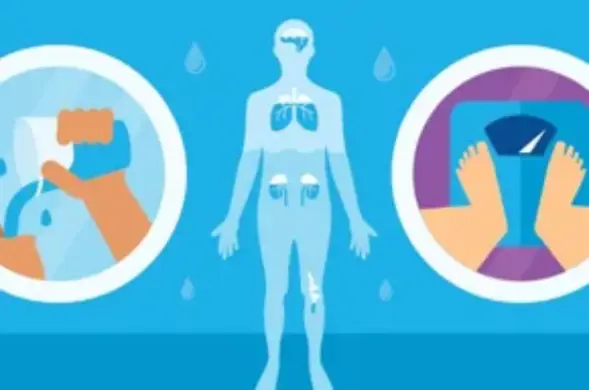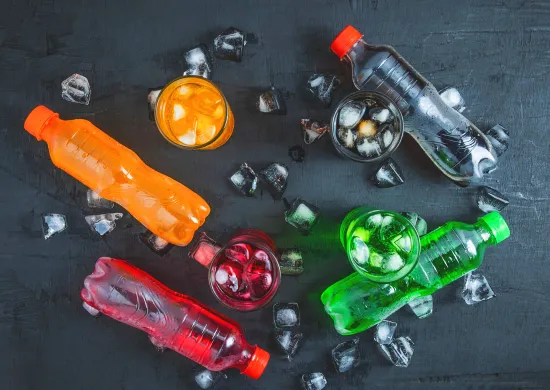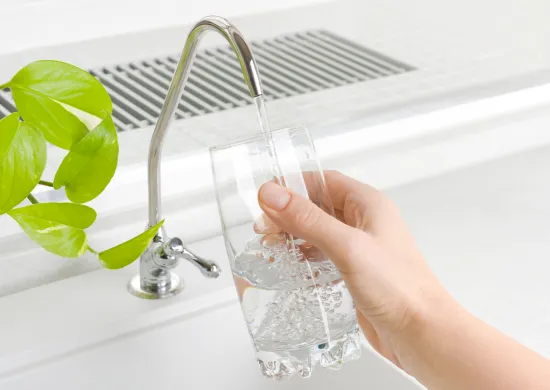Healthy hydration a healthier sports drink
Are you dehydrated? If your instinctive answer is no, are you sure?

Are you dehydrated? If your instinctive answer is no, are you sure?

You may think thirst or a darker, more concentrated colour of urine are the only side effects of dehydration, but the condition can lead to other, more serious symptoms. Common consequences of dehydration include headaches, fatigue, muscle cramps, difficulty focusing or feeling fuzzy throughout the day. In severe cases, fainting or seizures can even occur and, believe it or not, consuming too little water can also lead to overeating; we often mistake thirst for hunger. We’re here to help combat bouts of dehydration with tips and recipe ideas for homemade sport drinks to keep you hydrated even through the most gruelling workouts.
You’ve likely heard you should aim to drink eight glasses of water a day, and maybe you’ve seen people lug huge jugs of water around the gym. Perhaps your officemate keeps a pitcher of water on her desk and makes a point to drink it all each day. Which of these is right for you? Or do you need something different?
The answer, well, it depends on a few factors, because every person’s water needs are a bit different—and your individual water needs could change from one day to the next.
Hydration needs vary from person to person, but men typically require more water than women. The average man needs about 12 cups (3 liters) a day while the average woman needs around 9 cups (2.2 liters) per day. If you’re feeling overwhelmed by those amounts, remember that plenty of the food we eat hydrates us too.
Some of the most hydrating foods include watermelon, cucumber, strawberries, and lettuce. But you’ll still need to sip on something to truly quench your thirst, and generally, water is your best bet. Soft drinks may sound appealing when you’re hot and thirsty, but drinking soft drinks in order to rehydrate has actually been shown to worsen dehydration and increase the potential for kidney damage. Caffeinated beverages, such as coffee, are often said to act as diuretics. While this isn’t entirely true (if you regularly consume coffee, you will develop a tolerance for that amount of caffeine and it will no longer have the same diuretic action), it’s important to realise that caffeinated drinks don’t provide you with the optimum hydration to focus and feel energised the way plain old water does.
Another reason to consider sticking with water? Drinking a little more than 2 cups (500 milliliters) of pure water has been shown to increase your metabolic rate, which is a pretty cool way to increase that burn.
As we get older the human body is better able to conserve water. With age, our sense of thirst becomes less acute too, which makes it easy to become dehydrated without realising. The elderly population is generally more likely to take a variety of medications, some of which can lead to dehydration. And to top things off, because some elderly people experience mobility problems, it’s not only more challenging to get a glass of water, but also significantly more difficult to use the restroom regularly.
Infants and children are at even greater risk of dehydration, as they’re the demographic most likely to experience vomiting and diarrhea—both of which are seriously dehydrating. Young children may also simply lack the ability to communicate their thirst or get themselves something to drink.
This won’t come as a shock, but when it’s hot out, we sweat more—meaning we need to replace more fluids. High humidity is also a factor, as it prevents sweat from evaporating and cooling efficiently.
In addition to acute issues such as vomiting and diarrhea, other illnesses including uncontrolled or untreated diabetes, kidney disease, or even a cold or sore throat can increase your risk for dehydration.
Whether you participate in a sport or fitness event or work outdoors, your risk of becoming dehydrated increases with any vigorous activity.
Water is usually sufficient when it comes to quenching thirst, but sometimes your body needs a bit more. If you sweat profusely or are highly active for a sustained period of time, you may need to replace not only the water in your body but also electrolytes—and that’s when a sports drink comes in handy.
Sports drinks don’t just provide flavour, they help your body replace the water and the minerals lost through serious sweat. They include electrolytes such as sodium and potassium along with carbohydrates and water.
When can sports drinks be more helpful in preventing dehydration than water? If you’re engaging in serious exercise for an hour or more, it may be time to reach for a sports drink - this doesn’t necessarily mean you need to go to the store. One 20-ounce (591 millilitre) bottle per hour, beginning in the second hour, is a good place to start.
While sports drinks can help replenish lost minerals, they often pack a lot of sugar. Chances are you’ll see glucose, fructose, sucrose, or high-fructose corn syrup listed close the top of the list of ingredients for most sport drinks, which means that tasty drink comes with a lot of calories and unnecessary refined sugars. Though artificial sweeteners can have fewer calories, they can result in a significant amount of health concerns, including weight gain. Artificial dyes and flavours are also prevalent and could pose serious health risks as well as negatively affect memory and learning.
The good news is that by making your own at home you can get the flavour and benefits of a sports drink without the abundance of calories or unnatural additives.
The main requirements for a sports drink are water, a little sugar, salt – yes, you really do need sodium in your diet, and potassium to help replenish electrolytes.
Water and salt are self-explanatory, but when it comes to sugar, you have a few options. You can use a small amount of honey, which adds a very light sweetness, or maple syrup, which can taste a bit heavier and may work better with strong, citrus flavours such as orange or lemon. As far as potassium goes, the most accessible choice is sea salt, which provides sodium and potassium. Orange juice, coconut water, and maple syrup are also good sources.
For example, there are a number of all-natural lemon lime sports drink recipes available, most of which profess to be similar in taste to a very popular one you’ve probably seen at a few ballgames. DIY Natural features a recipe that uses fresh lime and lemon juice, local raw honey, and unrefined sea salt to provide health benefits even beyond hydration.
Love tea? You can incorporate it into your sports drink with this herbal cooler from Well + Good. It suggests using a citrus herbal tea along with honey or maple syrup, sea salt, and—if you like—trace mineral drops.
This cucumber lime electrolyte refresher, another selection from Well + Good, features cucumber, limes, and coconut water (with potassium, sugar, and electrolytes). Look for plain coconut water—flavoured coconut waters can include added sugar and flavors you may want to pass on in your sports drink.
When you make your own, you can tailor the ingredients and flavours to suit your own needs. If you have a short workout or one that’s not super intense, increase the water content of your homemade concoction. Or if a bit of flavour is all you’re after and there’s no need for a bunch of minerals, simply add a squeeze of lemon or infuse your water with some cucumber and basil.


